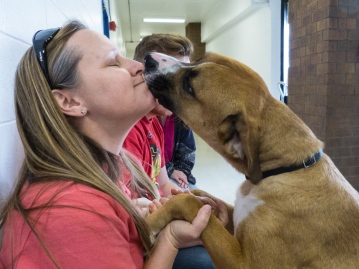
Thank You!
Allison’s Book Bag will no longer be updated. Thank you for eight years!
You can continue to follow me at:
- WordPress: Lincoln Pet Culture
- Pinterest: Pet Culture
- Instagram: Rainy The Therapy Cat
Categories
Archives
General Lists and Reviews
- Book Blogs members read, blog, write, and publicize books
- Children's Book Review helping adults to grow readers by offering reviews and book lists of the best books for kids of all ages, as well as interviews and literacy-based articles
- Fourth Musketeer Reviews of historical fiction and nonfiction for young people
- From the Mixed-Up Files group blog of middle-grade authors celebrating books for middle-grade readers.
- Good Reads social network for readers
- Graphic Novel Reporter essential graphic novels
- I.N.K. interesting nonfiction for kids
- Kid Reads info about favorite books, series, and authors for kids
- Kids Right To Read Offers support, education, and advocacy to people facing book challenges or bans and engages local activists in promoting the freedom to read.
- Midwest Review major Internet resource of reviews for publishers, writers, librarians, booksellers, and book lovers of all ages and interests
- Nonfiction Monday Rounding up the best nonfiction for children and teens.
- Teen Text Talk reviews and teacher advisories for young adult literature
- Young Adult Books Central a site for people who love books
Award Lists and Reviews
- Américas Award for Children’s & Young Adult Literature CLASP founded the Américas Award in 1993 to encourage and commend authors, illustrators and publishers who produce quality children’s and young adult books that portray Latin America, the Caribbean, or Latinos in the United States.
- American Library Association Awards awards include Caldecott, Newbery, Coretta Scott, Sibert, Theodor Giesel, and Laura Ingalls Wilder medals
- Book Awards for Children's and Youth Literature basic summary of purpose and criteria for each award
- Canadian Children's Book Awards awards administered by the Canadian Children’s Book Centre
- Children's Book Awards The Children’s & Teen Choice Book Awards is the only national book awards program where the winning titles are selected by children and teens.
- Christy Award The Christy Awards are awarded each year to recognize novels of excellence written from a Christian worldview.
- CILIP Carnegie & Greenaway Children's Book Awards The CILIP Carnegie and Kate Greenaway Medals are the UK’s oldest and most prestigious children’s book awards.
- Cybils children and young adult blogger literacy awards
- Dolly Gray Children’s Literature Award The Dolly Gray Children’s Literature Award was initiated in 2000 to recognize authors, illustrators, and publishers of high quality fictional and biographical books for young people that appropriately portray individuals with developmental disabilities
- Hans Christian Anderson Award The Hans Christian Andersen Awards is given to a living author and illustrator whose complete works have made a lasting contribution to children’s literature. The award is the highest international recognition an author can receive.
- Middle East Book Award The Middle East Book Award recognizes quality books for children and young adults that contribute meaningfully to an understanding of the Middle East and its component societies and cultures.
- Mythopoeic Fantasy Award Honors fantasy books for younger readers, in the tradition of The Hobbit or The Chronicles of Narnia
- National Book Award Established in 1950, the National Book Award is an American literary prize administered by the National Book Foundation, a nonprofit organization.
- Newbery Project reviews of Newbery Books
- Notable Books for a Global Society books for enhancing student understanding of people and cultures throughout the world
- Red House Book Award The Red House Children’s Book Award is a series of literary prizes for works of children’s literature published during the previous year in England.
- Sydney Taylor Award The Sydney Taylor Book Award is presented annually to outstanding books for children and teens that authentically portray the Jewish experience.
- Top Ten Tuesday Born of a love of lists, a love of books, and a desire to bring bookish friends together.
- YALSA Awards YALSA honors the best teen literature each year with its six literary awards, including Alex, Morris, and Printz.
Cultural & Regional Reviews
- 365 Days of Books Canadian and Newfoundland Picture Books
- American Indians in Children's Literature analysis of indigenous peoples in children’s and young adult books
- Asia in the Heart, World on the Mind blog about children’s and YA books set in Asia, with Asian characters or characters of Asian descent, and with Asian authors and illustrators or of Asian descent.
- Caribbean Children's Literature celebrates Jamaican and Caribbean lives
- CBC Diversity dedicated to increasing the diversity of voices and experiences contributing to children’s literature
- Celebrating Latino Children's Literature, Literacy, and Libraries evaluation of Latino children’s and young adult literature
- Delightful Children's Books a blog featuring children’s books for reading around the world
- Fifty Multicultural Books Every Child Should Know introduces 50 essential books and a range of authors and illustrators for children
- Hawaii Book Blog learn about and discuss the literature of the Hawaiian islands
- Heritage Room Nebraska Authors
- IBBY international network of people from all over the world who are committed to bringing books and children together
- Jewish Book Council book list curated by the Association of Jewish Libraries, which fosters access to information, learning, teaching and research related to the Jewish experience
- Latinos in Kid Lit Exploring the World of Latino YA, MG, and Children’s Literature
- Multicultural Children's Literature annotated bibliographies of children’s multicultural books appropriate for the elementary grades
- Oyate educational organization that reviews children’s literature and advocates for Native Americans to be portrayed with historical accuracy and cultural appropriateness
- Paper Tigers emphasis on books set in Pacific Rim and Asia
- Sea Stacks information about Atlantic Canada books for children and young people
- The Brown Bookshelf push awareness of the myriad of African American voices writing for young readers.
- Thirty Multicultural Books Every Teen Should Know introduces thirty essential books and a range of authors for teens
- Twenty Eight Days Later: The Brown Bookshelf a black history celebration of children’s and young adult literature
Other Topic Reviews
- Amelia Bloomer Project recommended feminist literature for birth through 18
- Boys and Literacy Reviews of products for boys that promote learning and reading
- Children's Disabilities Reviews of recommended books for parents, teachers and children on special needs topics.
- Disability in KidLit Monthly reviews, guest posts, and discussions about the portrayal of disabilities in MG/YA fiction
- Guys Lit Wire news and reviews about books for teenage boys
- Guys Read lists and review of books that guys like
- ReaderGirlz literacy and social media project for teens
- The Pirate Tree social justice in children’s literature
- Well-Read Naturalist books reviews of about any and all of the topics classifiable under the general category of natural history
- Young Adult Problem Fiction and Nonfiction annotated list for teachers of young adult problem books
MEMES I Participate In
- Saturday Snapshot To participate in the Saturday Snapshot meme post a photo that you (or a friend or family member) have taken and write a caption for it.
- Six Word Saturday All that’s necessary to participate is to describe your life (or something) in a phrase using just six words.
- Wish List Wednesday Post about one book per week that has been on your wishlist for some time, or just added, that you can’t wait to get off the wishlist and onto your wonderful shelves.
- Feline Friday All you have to do is post a picture of a cat on your website.
- Saturday Review Find a book review on your blog posted sometime during the previous week.
Personal News
- 2011 Stats for Allison's Book Bag
- 2012 Stats for Allison's Book Bag
- 2013 Stats for Allison's Book Bag
- 2014 Stats for Allison's Book Bag
- 4-H Dog Agility is all about Having Fun Published October 2012 online and in an insert.
- A Girl, A Cat, and A Fairy Published June 2010 on the Aurora Wolf Ezine. Available in print in the Aurora Rising Anthology.
- A Heart for Homeless Cats My article about the work of a local rescue group that helps homeless cats appears on page 18.
- Adventures in Publishing My response to the question: “What genres are you sick of seeing?”
- Adventures in Publishing My response to the question: “How has blogging changed how you read?”
- Barnabas, Son of Encouragement Published May 2015 as a guest post in Open Theism.
- Blogger Love interview and guest review at Nightly Reading
- Canada-A New Homeland Published July 2013 as a guest post in Open Theism.
- Collaboration produces pet ownership curriculum A news report about one of a series of educational plays that I wrote for Hearts United for Animals
- Customer Snapshot blurb about me at Lincoln City Libraries site
- Deadline near for Lincoln Animal Ambassadors’ The Mighty and the Tiny' Project Published August 2016 online and in an insert.
- Freedom Published July 2014 as a three-part guest post in Open Theism.
- Having fun competing at highest levels of dog agility Published December 2012 both online and in an insert.
- Lincoln Animal Ambassadors My educational blog posts committed to improving the lives of animals.
- Lincoln Animal Ambassadors Honored at Homeless Coalition
- Lincoln Animal Ambassadors, The Cat House raise over $7,500 at Meow & Chow Published November 2016 online and in an insert.
- Lincoln Animal Ambassadors’ Food Bank Moves to Bigger Location
- Meow & Chow is just around the corner Published October 2016 online and in an insert.
- Nominated for Liebster Award!
- Students Help Local Animal Shelter A news report about one of my Community Learning Center clubs: “Writers to the Rescue”.
- The Masquerade Crew interview with me about Allison’s Book Bag
- Their Daughter Rose Published April 2010 on the Enchanted Conversation Ezine.
- Three Ways to Help Animal Ambassadors Published April 2017 online and in an insert.
- Volunteers Needed for Lincoln Animal Ambassadors Published December 2017 online and in an insert.
- YA Promo Central interview with me about Allison’s Book Bag
Join 126 other subscribers






Recent Comments